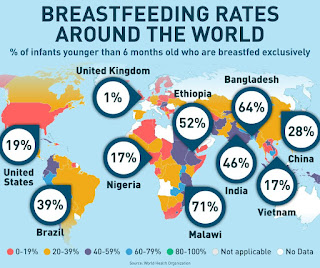Not sooner had
you returned from the hospital after having your baby and after the baby's
umbilical cord had fallen than your baby began to writhe in pain, arch it's
back and cry at intervals. It seemed to get worse at night.
People around
called it different names but the ones that stood out were colic and navel pain.
They went ahead to reel out treatments which included gripe water, gbomoro, bitter
kola water, salt water just name it.
No matter which one you chose,
the problem remained so you kept giving treatment after treatment to
your baby whose organs are still very fragile and shouldn't be exposed to
chemicals unless when completely necessary.
Familiar?
Infant gas
can be distressing to both mother and baby. It is said to be a very normal occurrence in
babies which usually happens either due to harmless bacteria breaking down sugars in
the large intestines or air swallowed by the baby when crying or feeding. Several
steps may need to be taken to reduce the gas and distress caused by it . This
gas pain usually reduces as your baby's digestive system matures, sometime
around the baby's fourth month.
When you
feed your baby , keep your baby's head higher than his stomach. This ensures the
milk sinks downwards and the gas goes up making it easier to burp out. Also use
a leisurely pace, your baby tends to gulp in air when sucking at a fast pace. If
your milk is flowing fast you may need to remove your baby for few seconds and
then continue. You should also burp the baby at intervals preferably when the
baby pauses during feeding. These help expel the gas that could cause pain and discomfort.
This gas
can also be produced when a breastfeeding mum eats gas-forming vegetables and
foods like cabbage, onions, beans, and even dairy products (like milk and cheese). Mums may need to monitor their babies' reactions for about 24 hours after
they (the mums) have eaten certain foods to note the ones which cause
discomfort to their babies and thus reduce their intake of such foods.
If you bottle-feed
your baby, ensure the nipple of the bottle lets milk out slowly as fast
flowing nipples could make the baby gulp in a lot of air when feeding. That is, let the nipple hole be small. You may also need to check if it is the formula that is causing the gas pain so you change the brand.
When your
baby is experiencing gas pain, it is advised you put your baby on his back and
gently massage his tummy in a clockwise direction, you could also gently pump
the baby's leg back and forth like in a bicycle-riding pattern. These help
release and expel some of the gas.
If the gas
pain is accompanied by fever, your baby is extremely fussy or unable to have bowel movements, or your instincts
demand so, please take the baby to his pediatrician as soon as possible. It is
always better safe than sorry.
We need to
reduce the rate at which we expose our babies to chemicals especially in the
form of drugs. Drugs for babies should be ONLY when necessary and prescribed by
a pediatrician.












